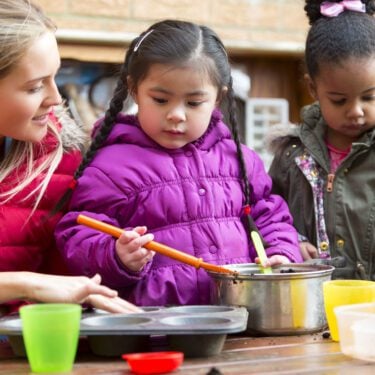Free nursery places disproportionately benefit children from higher income families, according to new Nuffield-funded research at LSE’s Centre for Analysis of Social Exclusion (CASE).
Since 2004, all three-year-olds have been entitled to a free nursery place. In 2010 this entitlement rose from 12.5 to 15 hours a week and in 2013, free places were extended to two-year-olds from low-income families. Last year, there was an additional expansion to 30 funded hours a week for three and four-year-olds with working parents. The government currently spends £6 billion a year in total on early education and childcare.
Using the National Pupil Database, Dr Tammy Campbell, Dr Ludovica Gambaro and Dr Kitty Stewart from LSE’s CASE, examined all autumn-born four-year-olds attending nursery in January 2011 and asked whether they started attending when first eligible, in January 2010. A significant proportion, 18.4 per cent, had not done so.
Researchers found that almost one in five children delays taking up a free place in pre-school education – most of them from low-income families. Around one third of persistently poor children delayed, compared to one sixth of their higher-income peers.
Persistently poor children who claim free school meals (FSM) for all three years of early primary school are 13 percentage points less likely to attend for the full five terms of free pre-school education than children from higher-income families who never claim FSM.
The researchers also examined whether the type of pre-school provision available locally makes a difference to take-up. They found that in areas where more children take their places in Sure Start centres, take-up was highest among all children – and the gap between low- and higher-income children much smaller. In contrast, areas with most pre-school places provided through the private sector have the largest gap in take-up between low- and higher-income families.
The paper concludes by saying that “An autumn-born child in a higher income working family will benefit from five terms at 30 hours compared to three terms at 15 hours for a summer-born children in a family whose parents are unemployed. Without serious attention to this issue, the universal free places, while hailed as a great success in the prevalent policy discourse, look set to play a part in embedding or widening inequalities, in direct contrast to stated policy aims.”
Dr Tammy Campbell commented: “Universally funded pre-school education is not, in fact, being accessed equally by all children. The families who are benefitting most from the policy are those who are already advantaged in many ways – while low-income children miss out. The recent introduction of more free hours for parents earning up to £100,000 per annum is likely to worsen this situation, as well as closures of accessible provision in the state and voluntary sectors, including Sure Start centres. It’s time for a clear and transparent reassessment of the purpose of funding for the pre-school stage – looking properly at which children win under the current system, and at who misses out.”





















































